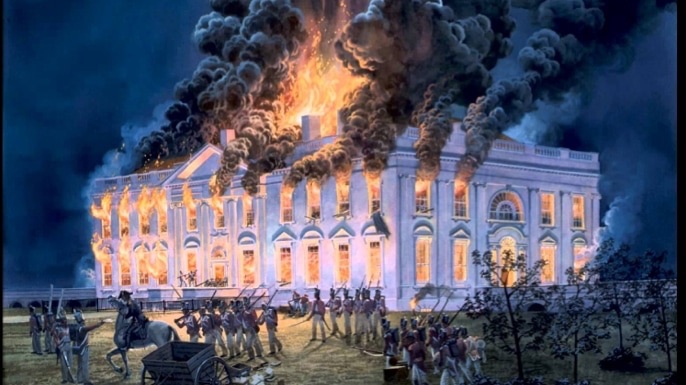 Where history is concerned, I'm a jack of all trades and master of none. My specialty in college was the French Revolution, but sadly that era hasn't been marketable since Les Miz. And since I'm more of a story teller than historian, I prowl for interesting subject matter, regardless of the time period, and then learn as I go. Which is how I found myself in the War of 1812 as it relates to an upcoming book, Strange and Obscure Stories of Washington, D.C. This, of course, involves the burning Washington by the British, after they brushed aside American troops at the Battle of Bladensburg. Historians differ on the American performance at Bladensburg. Harry Ammon called it “the greatest disgrace ever dealt to American arms,” while in the opinion of J.C.A. Stagg, it was “the most humiliating episode in American history.” The truth is probably somewhere in between. But be that as it may, the British were able to focus on the Americans largely because of the surrender of Napoleon, who had been occupying most of the Brits' attention on the Continent. So the opening to my chapter went like so: On the morning of June 18, 1815, a Sunday, Napoleon Bonaparte took his breakfast on a fine set of silver outside the town of Waterloo in modern-day Belgium. To his assembled officers, he dismissed the talents of his opponent in battle that day, the Duke of Wellington, saying that beating him in the field should be of no more trouble than—eating breakfast. The great general might have simply been trying to boost his officers’ confidence, but of course it was a statement that came back to haunt him. Four thousand miles away, in Washington, D.C., it was unlikely that residents, when they eventually received the news, would have seen any potential cause and effect between Napoleon’s surrender and their own pursuit of happiness. Wiser American statesmen, however, might have understood the implications. Britain had been fighting an epic war on the Continent, affording it few resources to allocate to the United States, where the pesky little brother was at it again. And with reason. The United States had won the Revolution, but to the newly minted Americans it seemed as if Britain hadn’t gotten the message. One problem. By the time of Waterloo, the War of 1812 had been over for four months. So what happened? The premise was still good—the surrender of Napoleon facilitated British attacks on America. But of course Napoleon capitulated twice, once at Waterloo, and once a year earlier after a disastrous winter campaign in Russia. It was the first surrender I needed to be referencing, not the second. Luckily it dawned on the at some point that 1815 came after 1814, and a great crisis, or at least a great embarrassment, was avoided. |
Archives
August 2022
Categories |
 RSS Feed
RSS Feed